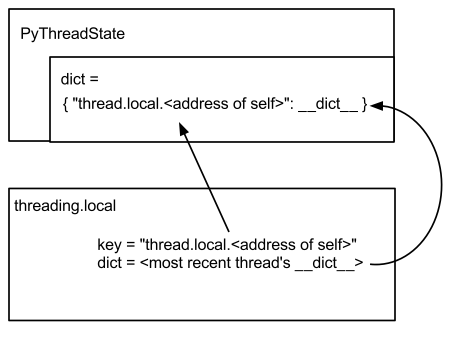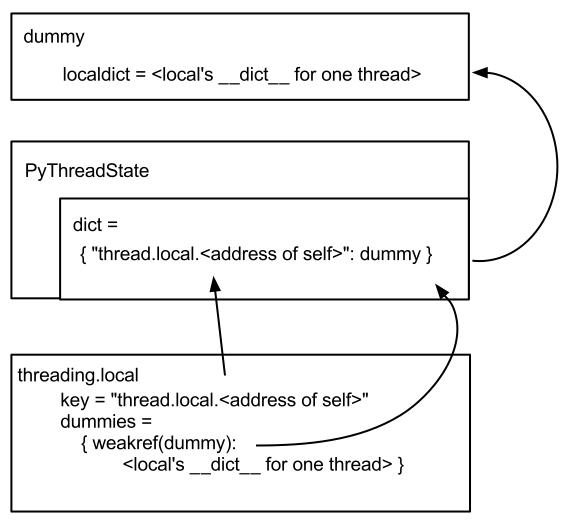奇怪的Python本地執行緒Python's Thread Locals Are Weird
The Weirdness
What do you think this script prints?:
import thread, threading, sys class Weeper(object): def __del__(self): sys.stdout.write('oh cruel world %s\n' % thread.get_ident()) local = threading.local() def target(): local.weeper = Weeper() t = threading.Thread(target=target) t.start() t.join() sys.stdout.write('done %s\n' % thread.get_ident()) getattr(local, 'whatever', None)
If you guessed something like this:
oh cruel world 4475731968 done 140735297751392
...then you'd be right, in Python after 2.7.1. In Python 2.7.0 and older (including the whole 2.6 series), the order of messages is reversed:
done 140735297751392 oh cruel world 140735297751392
In New Python, the Weeper is deleted as soon as its thread dies, and __del__ runs on the dying thread. In Old Python, the Weeper isn't deleted until the thread is dead and a different thread accesses the local's
__dict__. Thus the Weeper is deleted at the line getattr(local, 'whatever', None), after the thread dies, and Weeper.__del__
runs on the main thread.
What if we remove the getattr call? In Old Python, this happens:
done 140735297751392
Exception AttributeError: "'NoneType' object has no attribute 'get_ident'"
in <bound method Weeper.__del__ of <__main__.Weeper object at 0x104f95590>>
ignored
Without getattr, the Weeper isn't deleted until interpreter shutdown. The shutdown sequence is complex and hard to predict—in
this case the threadmodule has been set to None before
the Weeper is deleted, so Weeper.__del__ can't do thread.get_ident().
Thread Locals in Old Python
To understand why locals act this way in Old Python, let's look at the implementation in C. The core interpreter's PyThreadState struct
has a dictattribute, and each threading.local object
has a key attribute formatted like"thread.local.<memory
address of self>". Each local has a __dict__ of attributes per thread, stored in PyThreadState's dict with
the local's key.
threadmodule.c includes a function _ldict(localobject *self) which takes a local and finds its __dict__ for
the current thread. _ldict() finds and returns the local's __dict__ for
this thread, and stores it in self->dict.

This architecture has, in my opinion, a bug. Here's the implementation of_ldict():
static PyObject * _ldict(localobject *self) { PyObject *tdict = PyThreadState_GetDict(); // get PyThreadState->dict for this thread PyObject *ldict = PyDict_GetItem(tdict, self->key); if (ldict == NULL) { ldict = PyDict_New(); /* we own ldict */ PyDict_SetItem(tdict, self->key, ldict); Py_CLEAR(self->dict); Py_INCREF(ldict); self->dict = ldict; /* still borrowed */ if (Py_TYPE(self)->tp_init != PyBaseObject_Type.tp_init) { Py_TYPE(self)->tp_init((PyObject*)self, self->args, self->kw); } } /* The call to tp_init above may have caused another thread to run. Install our ldict again. */ if (self->dict != ldict) { Py_CLEAR(self->dict); Py_INCREF(ldict); self->dict = ldict; } return ldict; }
I've edited for brevity. There's a few interesting things here—one is the check for a custom __init__ method. If this object
is a subclass of local which overrides __init__, then __init__ is
called whenever a new thread accesses this local's attributes for the first time.
But the main thing I'm showing you is the two calls to Py_CLEAR(self->dict), which decrements self->dict's
refcount. It's called when a thread accesses this local's attributes for the first time, or if this thread is accessing the local's attributes after a different thread has accessed them—that is, if self->dict
!= ldict.
So now we clearly understand why a thread's locals aren't deleted immediately after it dies:
- The worker thread stores a Weeper in
local.weeper._ldict()creates a new__dict__for this thread and stores it as a value inPyThreadState->dict, and stores it inlocal->dict. So there are two references to this thread's__dict__: one fromPyThreadState, one from local. - The worker thread dies, and the interpreter deletes its
PyThreadState. Now there's one reference to the dead thread's__dict__:local->dict. - Finally, we do
getattr(local, 'whatever', None)from the main thread. In_ldict(),self->dict != ldict, soself->dictis dereferenced and replaced with the main thread's__dict__. Now the dead thread's__dict__has finally been completely dereferenced, and the Weeper is deleted.
The bug is that _ldict() both returns the local's __dict__ for
the current thread, and stores a reference to it. This is why the __dict__ isn't
deleted as soon as its thread dies: there's a useless but persistent reference to the__dict__ until another thread comes
along and clears it.
Thread Locals in New Python
In New Python, the architecture's a little more complex. EachPyThreadState's dict contains a dummy for each local, and each
local holds a dict mapping weak references of dummies to a per-thread __dict__.

When a thread is dying and its PyThreadState is deleted, weakref callbacks fire immediately on that thread, removing the
thread's __dict__ for each local. Conversely, when a local is deleted, it removes its dummy fromPyThreadState->dict.
_ldict() in New Python acts more sanely than in Old Python. It finds the current thread's dummy in the PyThreadState,
and gets the __dict__ for this thread from the dummy. But unlike in Old Python, it doesn't store a extra reference to __dict__ anywhere.
It simply returns it:
static PyObject * _ldict(localobject *self) { PyObject *tdict, *ldict, *dummy; tdict = PyThreadState_GetDict(); dummy = PyDict_GetItem(tdict, self->key); if (dummy == NULL) { ldict = _local_create_dummy(self); if (Py_TYPE(self)->tp_init != PyBaseObject_Type.tp_init) { Py_TYPE(self)->tp_init((PyObject*)self, self->args, self->kw); } } else { ldict = ((localdummyobject *) dummy)->localdict; } return ldict; }
This whole weakrefs-to-dummies technique is, apparently, intended to deal with some cyclic garbage collection problem I don't understand very well. I believe the real reason why New Python acts as expected when executing my script, and why Old Python acts weird,
is that Old Python stores the extra useless reference to the __dict__ and New Python does not.
Update: I finally found the bug reports that describe Old Python's weirdness and 2.7.1's solution. See:
- Issue 1868: threading.local doesn't free attrs when assigning thread exits
- Issue 3757: threading.local doesn't support cyclic garbage collecting
相關文章
- python 多執行緒之threadPython執行緒thread
- python多執行緒之從Thread類繼承Python執行緒thread繼承
- Python模組學習:thread 多執行緒處理Pythonthread執行緒
- Thread(執行緒)thread執行緒
- Python多執行緒之_thread與threading模組Python執行緒thread
- 什麼是Python執行緒?Python執行緒如何建立?Python執行緒
- Python的執行緒池Python執行緒
- python中的執行緒Python執行緒
- Java 中的執行緒 threadJava執行緒thread
- python之多執行緒Python執行緒
- python多執行緒Python執行緒
- Python執行緒指南Python執行緒
- Python 多執行緒Python執行緒
- python多執行緒程式設計1— python對多執行緒的支援Python執行緒程式設計
- 通過transmittable-thread-local原始碼理解執行緒池執行緒本地變數傳遞的原理MITthread原始碼執行緒變數
- python中的執行緒池Python執行緒
- 理解 Python 中的執行緒Python執行緒
- 理解Python中的執行緒Python執行緒
- kernel-執行緒thread執行緒thread
- Python3 多執行緒程式設計(thread、threading模組)Python執行緒程式設計thread
- python基礎執行緒-管理併發執行緒Python執行緒
- python多執行緒中:如何關閉執行緒?Python執行緒
- Python程式VS執行緒Python執行緒
- python之執行緒鎖Python執行緒
- python 程式、執行緒 (二)Python執行緒
- python 程式、執行緒 (一)Python執行緒
- python執行緒筆記Python執行緒筆記
- python執行緒池示例Python執行緒
- python多執行緒示例Python執行緒
- Python 執行緒池使用Python執行緒
- python執行緒池的實現Python執行緒
- Thread執行緒終止interruptthread執行緒
- new Thread與執行緒建立thread執行緒
- 【 Thread】建立執行緒的2種方法thread執行緒
- thread 描述執行緒的一個類thread執行緒
- python3 多執行緒Python執行緒
- 04.python-多執行緒Python執行緒
- python有多執行緒嗎Python執行緒